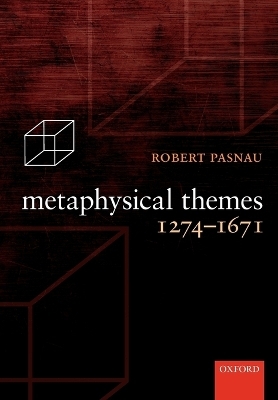
Metaphysical Themes 1274-1671
Seiten
2013
Oxford University Press (Verlag)
978-0-19-967448-0 (ISBN)
Oxford University Press (Verlag)
978-0-19-967448-0 (ISBN)
Robert Pasnau tells a continuous story about the development of philosophy from the late Middle Ages into the early modern era of the seventeenth century. The focus is questions in metaphysics concerning the nature of matter and the structure of the material world.
Robert Pasnau traces the developments of metaphysical thinking through four rich but for the most part neglected centuries of philosophy, running from the thirteenth century through to the seventeenth. At no period in the history of philosophy, other than perhaps our own, have metaphysical problems received the sort of sustained attention they received during the later Middle Ages, and never has a whole philosophical tradition come crashing down as quickly and completely as did scholastic philosophy in the seventeenth century. The thirty chapters work through various fundamental metaphysical issues, sometimes focusing more on scholastic thought, sometimes on the seventeenth century. Pasnau begins with the first challenges to the classical scholasticism of Bonaventure and Thomas Aquinas, runs through prominent figures like John Duns Scotus and William Ockham, and ends in the seventeenth century, with the end of the first stage of developments in post-scholastic philosophy: on the continent, with Descartes and Gassendi, and in England, with Boyle and Locke.
Robert Pasnau traces the developments of metaphysical thinking through four rich but for the most part neglected centuries of philosophy, running from the thirteenth century through to the seventeenth. At no period in the history of philosophy, other than perhaps our own, have metaphysical problems received the sort of sustained attention they received during the later Middle Ages, and never has a whole philosophical tradition come crashing down as quickly and completely as did scholastic philosophy in the seventeenth century. The thirty chapters work through various fundamental metaphysical issues, sometimes focusing more on scholastic thought, sometimes on the seventeenth century. Pasnau begins with the first challenges to the classical scholasticism of Bonaventure and Thomas Aquinas, runs through prominent figures like John Duns Scotus and William Ockham, and ends in the seventeenth century, with the end of the first stage of developments in post-scholastic philosophy: on the continent, with Descartes and Gassendi, and in England, with Boyle and Locke.
Robert Pasnau is a Professor of Philosophy at the University of Colorado at Boulder. He is the author of many books and articles on the history of philosophy, including Thomas Aquinas on Human Nature (Cambridge, 2002), which won the American Philosophical Association Book Prize.
I. MATTER; II. SUBSTANCE; III. ACCIDENTS; IV. EXTENSION; V. QUALITY; VI. UNITY AND IDENTITY
| Erscheint lt. Verlag | 7.2.2013 |
|---|---|
| Verlagsort | Oxford |
| Sprache | englisch |
| Maße | 170 x 246 mm |
| Gewicht | 1288 g |
| Themenwelt | Geschichte ► Allgemeine Geschichte ► Mittelalter |
| Geisteswissenschaften ► Philosophie ► Metaphysik / Ontologie | |
| Geisteswissenschaften ► Philosophie ► Philosophie des Mittelalters | |
| Geisteswissenschaften ► Philosophie ► Philosophie der Neuzeit | |
| ISBN-10 | 0-19-967448-5 / 0199674485 |
| ISBN-13 | 978-0-19-967448-0 / 9780199674480 |
| Zustand | Neuware |
| Haben Sie eine Frage zum Produkt? |
Mehr entdecken
aus dem Bereich
aus dem Bereich
eine neue Geschichte des Mittelalters
Buch | Hardcover (2023)
C.H.Beck (Verlag)
CHF 53,20


